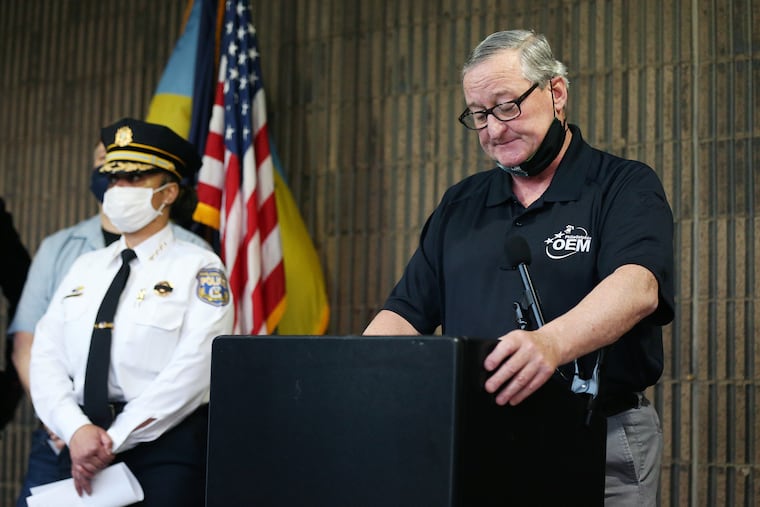Philadelphia’s ‘out of touch’ leadership failed at critical time | Editorial
Mayor Kenney's administration had to see the city burn to learn that they were 'out of touch.'

The country and the city are in the midst of two devastating and challenging crises — one a fatal pandemic, and one a fatal epidemic of brutality. Both are disproportionately impacting black lives.
But the city’s leaders are struggling— and falling short in key areas.
It’s hard to know which galling image of Philadelphia will end up defining this period: The flames from police cars and shattered glass from storefronts in Center City. Or the horror of protesters trapped on I-676 as police shoot canisters of tear gas and rubber bullets. Or vigilantes with machetes terrorizing Fishtown, with police unbothered despite clear violation of curfew — or vigilantes with baseball bats in South Philadelphia.
These are not fleeting images: They document a series of missteps, lack of planning and anticipation, and a too-mild reaction to correct those early missteps.
It was city leaders who rejected a plan to appropriately staff the first weekend of protests after George Floyd’s death, leading to chaos. We don’t know precisely who, but we do know that Mayor Jim Kenney, Managing Director Brian Abernathy, and Police Commissioner Danielle Outlaw were among those who approved the use of tear gas and rubber bullets on protesters, but also did not act to restrain violent white mobs.
» READ MORE: Critical mistakes doomed the police response to Philly’s George Floyd demonstrations
Ahead of the Police Department’s budget hearing on June 10, Abernathy delivered the city’s apology for fumbling the protest response. He admitted that he hadn’t realized how “out of touch” he was with the “anger and rage and frustration of folks I’m hired to serve.”
That sentiment should go double for the mayor.
For nearly three years, despite expressing support for the removal of the Frank Rizzo statue, and despite outcry from the community, Kenney delayed its removal, giving excuses about how the statue was built into the ground — only to remove it in the middle of the night after protesters tried to topple it. Just last week, Kenney rolled out the same delaying playbook, announcing that the Art Commission will review the Christopher Columbus statue in Marconi Plaza.
» READ MORE: Rizzo statue is gone, but not yet forgotten | Editorial
His response to an armed mob “protecting” a police precinct Fishtown, condemning vigilantism but adding, “We understand the desire of communities to protect their neighborhoods, and if they want to do that in peace, we would allow it,” was mealymouthed at best and sent a confusing message about the meaning of curfew. Two weeks after, the same mild response played out in South Philly as an armed mob attacked protesters around the Columbus statute, with police standing by.
After three weeks of protests and demonstrations over racial injustice, often punctuated by the exact police brutality that people are decrying, the mayor declared Juneteenth a city holiday. That is not nearly enough.
Nor is a last-minute alteration of a police budget, canceling a proposed increase of $19 million and shifting $14 million to the Managing Director’s Office to oversee crossing guards and public safety officers.
One of the reasons for the last-minute change to the budget was that the administration erroneously underestimated the impact of COVID-19 on revenues — to the tune of $100 million.
» READ MORE: Philly’s coronavirus budget hole grows by $100 million, and could lead to service cuts or tax hikes
City Council met virtually at 11 p.m. on Wednesday to pass amendments so they can vote on the budget before ending their session on June 25. Then, Council will go on their annual three-month break. That means that in the midst of this crucial time, any important piece of legislation, oversight function, or approval of land-use requests will have to wait for September. Given the extraordinary challenges the city still faces as it moves to reopen, that’s outrageous.
Mayor Kenney and Commissioner Outlaw announced on Monday a plan to hire an outside consultant to evaluate the city’s response to the protests.
Instead of spending money on another consultant, Kenney should appoint a civilian-led commission to investigate his administration’s response. To ensure that the commission is not just a cover for inaction, as many “riot reports” have been since the 1960s, the commission should be tasked with coming up with specific, and binding, recommendations.
After the MOVE bombing, an event for which the city’s out of touch leadership failed to formally apologize on its 35th anniversary, Mayor W. Wilson Goode Sr. appointed the MOVE Commission. To this day, no one has been held personally accountable for MOVE, but the hearings created a public record of the events — including the infamous admission by police that they “let the fire burn.” Clearly, the fire is still burning.